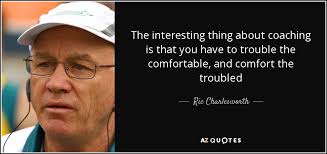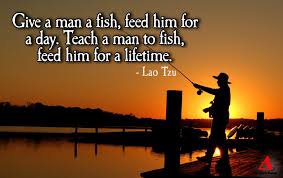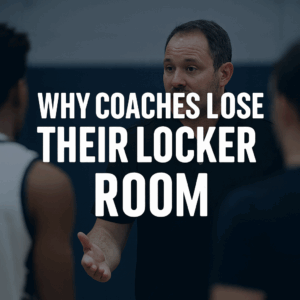“The interesting thing about coaching is that you have to trouble the comfortable, and comfort the troubled.” – Ric Charlesworth
Coaching Your Coaches: A Call to Action
Last week, I had the great honor of delivering the keynote speech at the Northwest Athletic Conference (NWAC) Athletic Director and Commissioner Conference in Portland, OR. The NWAC is a dynamic consortium of 36 (and growing) 2-year community colleges in Northern California, Oregon, and Washington, all competing for regional championships in seven sports. This highly competitive league is composed of passionate and dedicated coaches, administrators, and nearly 5,000 collegiate student-athletes…many who move on to play at the NCAA D1, D2, D3 and NAIA levels.
My keynote address, titled “Stronger Teams, Smarter Leadership: Elevating Your Athletic Department with Significance,” focused on a pressing issue in high school and college athletics: the lack of structured support and guidance for coaches.
The Unspoken Challenge: Coaching the Coaches
One of the most overlooked reasons why coaches and athletic administrators struggle or leave the profession has little to do with their talent or love of the game. Instead, it stems from the lack of mentorship and training provided when they are first hired. Too often, athletic administrators take a hands-off approach, assuming that new hires will naturally figure things out on their own. But the reality is, many are left to navigate the complexities of their roles without any formal guidance.
To illustrate this point, I posed a question to the room filled with ADs, Commissioners, and coaches:
How many of you were given training or guidance in the following areas when you first started your career?
- Creating and balancing a budget
- Ordering gear and equipment
- Scheduling games
- Fundraising
- Recruiting
- Practice planning
- Developing game rotations/substitutions
- Strength & conditioning programs
- Basic sports medicine (e.g., wrapping an ankle, managing injuries)
- Effective time management and delegation
- Team policies and rule-setting
- Travel planning and logistics
- Conflict resolution
- Public speaking
- Social media management
- Film analysis and editing
- Hiring and developing assistant coaches
- Maintaining a work-life balance
The response was telling. For each bullet point, only a handful of hands—at most 6-7 out of the 70+ in attendance—were raised. The overwhelming sentiment in the room was frustration. Many wished they had received structured guidance when they were starting out, rather than learning through years of trial and error.
The problem is systemic because I then followed up with “how many of you who were not coached on these very important skills and responsibilities are now taking the time to coach and mentor your coaching staffs on these issues?” Most of the room reluctantly dropped their eyes or slowly shook their heads because they are passing on their lack of coaching and mentoring to the next generation of leaders. How do we pass something profound and significant on if we were never taught it?
The Cost of Neglecting Coach Development
At both the high school and college levels, we often emphasize how much we care about student-athletes and their experiences. Yet, we continue to hire coaches with the expectation that they will instinctively know how to manage the wide-ranging responsibilities required of them. The best coaches do figure it out—but at what cost? They endure failures, setbacks, and years of struggle before mastering their roles.
For many, the learning curve is too steep, and they don’t last long enough to reach their full potential. If a coach struggles significantly in their first two years, how likely are they to remain in the profession? The unfortunate truth is…not many do.
This lack of structured coaching for our coaches is not just a gap in our system—it is an epidemic. And if left unaddressed, it will continue to drain the sports we love of passionate and capable leaders.
A Call to Action: Elevating Coaching Through Leadership
My career has shifted from coaching to consulting, with this issue at the heart of my work. There are exceptional leaders in athletics across the country, but they are often overworked, underpaid, and undervalued. While these challenges cannot be solved overnight, we can make meaningful progress by engaging key decision-makers—college presidents, high school superintendents, and principals—to establish clear policies, procedures, and expectations for coach development. By providing the necessary tools and resources, we can help every coach maximize their potential and, in turn, create the best possible experience for student-athletes.
Coaching Begins at the Top
In the end, the solution starts with experienced leaders sharing their knowledge and making a conscious effort to coach their coaches. When we invest in the growth and development of our coaches, we build stronger teams, smarter leadership, and a more sustainable future for athletics.
I look forward to being part of your journey as you work toward these goals.
If you’ve enjoyed this blog and want to dive deeper into understanding motivation and personal growth, check out my book, Significant Recruiting: The Playbook for Prospective College Athletes. It can be purchased through this link: https://coachmattrogers.com/book-significant-recruiting/.
Families and school administrators can also schedule a strategy session with me through this link: https://coachmattrogers.com/contact/#. Together, we can uncover what truly motivates you and help you achieve lasting significance.






